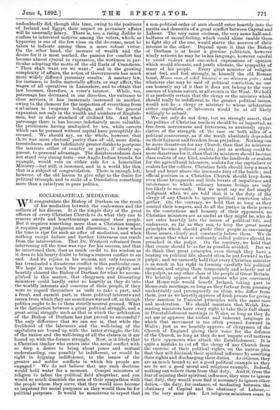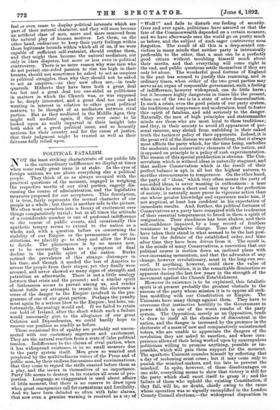ECCLEST A STICAL MEDIATORS.
wE congratulate the Bishop of Durham on the result of his mediation between the coalowners and the colliers of his diocese. It is the simple duty of the great officers of every Christian Church to do what they can to remove strife and heartburnings amongst their people. But it requires something more than a Christian temper, it requires great judgment and discretion, to know when the time is ripe for such an offer of mediation, and when nothing except failure and further bitterness can result from the intervention. That Dr. Westcott refrained from intervening till the time was ripe for his success, and that he intervened then, does as much credit to his wisdom as it does to his hearty desire to bring a ruinous conflict to an end. And. we rejoice in his success, not only because it has terminated a disastrous conflict in this particular case. We hope it may teach the people who very rightly and heartily cheered the Bishop of Durham for what he accom- plished in this matter, that clergymen and Dissenting ministers could hardly enter so heartily as they do into the worldly interests and concerns of their people, if they were to regard themselves as unfit to take a part, and a frank and earnest part, in those political interests and issues from which they are sometimes warned off, as though politics ought to be to them strictly neutral ground. What is the distinction between a great political struggle, and a great social struggle such as that in which the arbitration of the Bishop of Durham has just proved so successful ? The only difference that we can see is, that while the livelihood of the labourers and the well-being of the capitalists are bound up with the latter struggle, the life of the nation and the well-being of all the classes in it are bound up with the former struggle. Now, is it likely that a Christian teacher who enters into the social conflict with so deep a desire to bring about peace and mutual understanding, can possibly be indifferent, or would be right in feigning indifference, to the issues of the greater and nobler conflicts in which his people are engaged We do not believe that any such doctrine would hold water for a moment. Compel ministers of religion to taboo the political field altogether, and you would so much diminish the area of their sympathies with the people whom they serve, that they would soon become as impotent for social purposes as they would then be for political purposes. It would be monstrous to expect that a non-political order of men should enter heartily into the merits and demerits of a great conflict between Capital and Labour. The very same coolness, the very same half-and- halfness of moral feeling, which could alone enable them to fight shy of the one, would starve the sources of their interest in the other. Depend upon it that the Bishop of Durham is at heart a genuine politician, however wisely reticent he may be in his language, however careful to avoid. violent and one-sided expressions of opinion which would alienate, and justly alienate, the sympathy of many of his people. Every great minister of religion must feel, and feel strongly, in himself the old Roman boast, Homo sum, et nihil humani a me alienum puto ; and whatever else may be said of political conviction, no one can honestly say of it that it does not belong to the very essence of human nature, at all events in the West. We hold it as perfectly certain that the clergy or the ministry which should really be indifferent to the greater political issues, would not be a clergy or ministry to whose arbitration either capitalists or labourers would be at all likely willingly to submit.
We not only do not deny, but we strongly assert, that the politics of Christian teachers should be as impartial, as free from narrowness and bitterness, as anxiously appre. ciative of the strength of the case on both sides of a political controversy, as if the result absolutely depended on their fairness and freedom from prejudice. Nothing can be more disastrous for any Church, than that its ministers should become political zealots; just as nothing could be more disastrous for it, than that its ministers should become class zealots of any kind, zealots for the landlords or zealots for the agricultural labourers, zealots for the capitalists or zealots for the colliers. Christian faith should. keep a man's head and. heart above the insensate fury of the battle ; and official position in a Christian Church should keep down even those brusqueries and little bursts of impatience and. intolerance to which ordinary human beings are only too likely to succumb. But we must say we feel simply indignant when we are told that it is the duty of the clergy of any Church to ignore political conviction alto- gether. On the contrary, we hold. that so long as they control their tempers, and do all the justice in their power to the convictions and honesty of their opponents, no Christian ministers are as useful as they might be, who do not enter heartily into the issues of political life, and endeavour, so far as they can, to keep the great moral principles which should guide their people in canvassing those issues, clearly and constantly before them. We do not mean that what is ordinarily called politics should be preached in the pulpit. On the contrary, we hold that that course should be as far as possible avoided. But we do think that great principles, even though they have a bearing on political life, should often be put forward in the pulpit ; and we earnestly hold that every Christian minister is as much in his right in forming carefully his political opinions, and urging them temperately and soberly out of the pulpit, as any other class of the people of Great Britain. We heartily approve of Irish priests who are convinced that Home-rule would benefit Ireland, taking part in Home-rule meetings, so long as they forbear from pressing uncharitably and peremptorily on those who differ from them, just as we heartily approve of Irish priests for giving their sanction to Unionist principles with the same care and moderation. We should maintain that Welsh Dis- senting ministers have every right to take their full share in Disestablishment meetings in Wales, so long as they do not use or approve the violent and indecent language in which that movement is too often pressed forward in Wales ; just as we heartily approve of clergymen of the Church of England giving their voice for the defence of the Church, so long as they do not impute evil motives to their opponents who attack the Establishment. It is quite a mistake to cut off the clergy of any Church from the exercise of their political rights, on the untrue plea that they will diminish their spiritual influence by asserting their rights and discharging their duties. As citizens, they are as much bound. to set it good political example as they are to set a good moral and religious example. Indeed, nothing can relieve them from that duty. And if, from the fear of injuring their spiritual influence, they were to ignore that duty, they would soon find. it necessary to ignore other duties,—the duty, for instance, of mediating between the obstinacy of Capital and the obstinacy of Labour,— On the very same plea. Let religious ministers cease. to feel or even cease to display political interests which are part of their natural character, and they will soon become an artificial class of men, more and more removed from the natural play of human motives. Let them, on the other hand, endeavour to keep their party feelings within those legitimate bounds within which all of us, if we were capable of sufficient self-restraint, should confine them, and they might then become the natural mediators, not only in class disputes, but more or less even in political controversy. There is no more reason why wise men who do not permit one-sided passion to rise too high in their breasts, should not sometimes be asked to act as umpires in political struggles, than why they should not be asked to act as umpires,—as they now often are,—in trade quarrels. Hitherto they have been both a great deal too hot and a great deal too one-sided as politicians in matters in which the Church was, or was supposed to be, deeply interested, and a great deal too cool and wanting in interest in relation to other great political matters, to be thought of as mediators between rival parties. But as they mediated in the Middle Ages, they might well mediate again, if they ever came to be looked upon as really impartial in their insight into both sides of a great political issue, and so honestly anxious for their country and for the cause of justice, that their judgment might be trusted as well as their fairness fully relied upon.



































 Previous page
Previous page